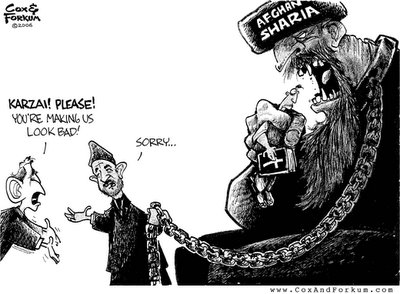
KABUL, Afghanistan — A court on Sunday dismissed the case against an Afghan man facing possible execution for converting from Islam to Christianity, officials said, paving the way for his release.
The move eased pressure from the West but raised the dilemma of protecting Abdul Rahman after his release as Islamic clerics have called for him to be killed.
Robert Tracinski commented on Friday:
Introducing a role for Islamic Sharia law, while also affirming religious freedom -- the ambiguity in both the Iraqi and Afghan constitutions -- was meant to evade the necessity for a head-on clash between Islam and secularism. The idea, apparently, was to delay a final choice between freedom and theocracy, in the hope that "moderate Muslims" would come to power and champion a liberal "interpretation" of Sharia. The article below spells out the result: from the beginning, Afghanistan has been convulsed by a series of rancorous conflicts between the more-liberal (and America-dependent) government of Hamid Karzai and Islamist judges, resulting in a series of blasphemy prosecutions that have been dropped or reversed by Karzai at the last minute, under Western pressure.
Remember the old adage about how a coward dies a thousand deaths? Similarly, in seeking to evade one big conflict, the pragmatist guarantees a thousand smaller, endlessly repeating conflicts later on.
The National Review article recommended by Tracinski: Sharia Calling by Nina Shea.
Rahman is not the only case where execution has been threatened over beliefs and ideas in the new Afghanistan. Last year, an Afghan journalist who argued against the heresy law was found guilty of it, and escaped death after international pressure. Before then, a female cabinet member was charged with blasphemy for criticizing Islamic law, but was also spared after international protest erupted. Other journalists were imprisoned for blasphemy after debating the compatibility of sharia law with democracy, but then quietly allowed to leave the country. It is even reported that other Christian converts are in prison there but not much is known about them. The administration needs to rescue Rahman as he is determined not to be found “innocent” as Undersecretary Burns had hoped.
But this is about more than Mr. Rahman. This will be a persistent, recurring problem under Afghanistan’s sharia apostasy and blasphemy laws. The administration also needs to do more to ensure the reform Afghanistan’s judiciary. President Karzai must be encouraged to wrest it from the control of Islamists like Supreme Court Chief Justice Fazl Hadi Shinwari, who once told our National Public Radio that it is his duty as a judge to “behead” those who do not conform to Islamic law. Americans continue to give billions of dollars, and sacrifice their lives to support the Afghan government. It not only serves compelling humanitarian interests to use this leverage now, but it would be a betrayal of America’s deepest national values not to.

No comments:
Post a Comment